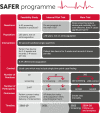How to embed qualitative research in trials: insights from the feasibility study of the SAFER trial programme
- PMID: 35549744
- PMCID: PMC9096750
- DOI: 10.1186/s13063-022-06308-7
How to embed qualitative research in trials: insights from the feasibility study of the SAFER trial programme
Abstract
Qualitative research can enhance the design, conduct and interpretation of trials. Despite this, few trials incorporate qualitative methods, and those that do may not realise their full potential. In this commentary, we highlight how qualitative research can contribute to the design, conduct and day-to-day running of a trial, outlining the working arrangements and relationships that facilitate these contributions. In doing so, we draw on (i) existing frameworks on the role of qualitative research alongside trials and (ii) our experience of integrated qualitative research conducted as part of the feasibility study of the SAFER trial (Screening for Atrial Fibrillation with ECG to Reduce stroke), a cluster randomised controlled trial of screening people aged 70 and above for atrial fibrillation in primary care in England. The activities and presence of the qualitative team contributed to important changes in the design, conduct and day-to-day running of the SAFER feasibility study, and the subsequent main trial, informing diverse decisions concerning trial documentation, trial delivery, timing and content of measures and the information given to participating patients and practices. These included asking practices to give screening results to all participants and not just to 'screen positive' participants, and greater recognition of the contribution of practice reception staff to trial delivery. These changes were facilitated by a 'one research team' approach that underpinned all formal and informal working processes from the outset and maximised the value of both qualitative and trial coordination expertise. The challenging problems facing health services require a combination of research methods and data types. Our experience and the literature show that the benefits of embedding qualitative research in trials are more likely to be realised if attention is given to both structural factors and relationships from the outset. These include sustained and sufficient funding for qualitative research, embedding qualitative research fully within the trial programme, providing shared infrastructure and resources and committing to relationships based on mutual recognition of and respect for the value of different methods and perspectives. We outline key learning for the planning of future trials.Trial registration: Screening for atrial fibrillation with ECG to reduce stroke ISRCTN16939438 (feasibility study); Screening for atrial fibrillation with ECG to reduce stroke - a randomised controlled trial ISRCTN72104369 .
Keywords: Atrial fibrillation; Frameworks; Qualitative research with trials; Working relationships.
© 2022. The Author(s).
Conflict of interest statement
The authors declare that they have no competing interests.
Figures
Similar articles
-
Cluster randomised controlled trial of screening for atrial fibrillation in people aged 70 years and over to reduce stroke: protocol for the pilot study for the SAFER trial.BMJ Open. 2022 Sep 9;12(9):e065066. doi: 10.1136/bmjopen-2022-065066. BMJ Open. 2022. PMID: 36691194 Free PMC article.
-
Why do people take part in atrial fibrillation screening? Qualitative interview study in English primary care.BMJ Open. 2022 Mar 16;12(3):e051703. doi: 10.1136/bmjopen-2021-051703. BMJ Open. 2022. PMID: 35296474 Free PMC article.
-
Randomised controlled trial of population screening for atrial fibrillation in people aged 70 years and over to reduce stroke: protocol for the SAFER trial.BMJ Open. 2024 Apr 25;14(4):e082047. doi: 10.1136/bmjopen-2023-082047. BMJ Open. 2024. PMID: 38670614 Free PMC article.
-
Folic acid supplementation and malaria susceptibility and severity among people taking antifolate antimalarial drugs in endemic areas.Cochrane Database Syst Rev. 2022 Feb 1;2(2022):CD014217. doi: 10.1002/14651858.CD014217. Cochrane Database Syst Rev. 2022. PMID: 36321557 Free PMC article.
-
Development and evaluation of a de-escalation training intervention in adult acute and forensic units: the EDITION systematic review and feasibility trial.Health Technol Assess. 2024 Jan;28(3):1-120. doi: 10.3310/FGGW6874. Health Technol Assess. 2024. PMID: 38343036 Free PMC article.
Cited by
-
Dentists' perspectives on selective caries removal for the management of deep carious lesions in permanent teeth.BMC Oral Health. 2025 Mar 9;25(1):362. doi: 10.1186/s12903-025-05699-8. BMC Oral Health. 2025. PMID: 40059145 Free PMC article. Clinical Trial.
-
An embedded qualitative study of the experiences of people with dementia, their caregivers and volunteer older adults who participated in the CREST resilience-building psychosocial intervention.BMC Geriatr. 2024 Sep 25;24(1):780. doi: 10.1186/s12877-024-05374-7. BMC Geriatr. 2024. PMID: 39322962 Free PMC article.
-
A qualitative enquiry into participants' and practitioners' experiences in the Australian Liver FaIlurE trial.BMJ Open. 2025 Feb 16;15(2):e089666. doi: 10.1136/bmjopen-2024-089666. BMJ Open. 2025. PMID: 39956593 Free PMC article. Clinical Trial.
-
The integration of rapid qualitative research in clinical trials: reflections from the ward-based goal-directed fluid therapy (GDFT) in acute pancreatitis feasibility trial.Trials. 2023 Mar 25;24(1):227. doi: 10.1186/s13063-023-07191-6. Trials. 2023. PMID: 36964583 Free PMC article.
-
Why do people choose not to take part in screening? Qualitative interview study of atrial fibrillation screening nonparticipation.Health Expect. 2023 Dec;26(6):2216-2227. doi: 10.1111/hex.13819. Epub 2023 Jul 14. Health Expect. 2023. PMID: 37452480 Free PMC article.
References
-
- Woolfall K, Young B, Frith L, Appleton R, Iyer A, Messahel S, et al. Doing challenging research studies in a patient-centred way: a qualitative study to inform a randomised controlled trial in the paediatric emergency care setting. BMJ Open. 2014;4(5):e005045. doi: 10.1136/bmjopen-2014-005045. - DOI - PMC - PubMed
-
- Bartlam B, Waterfield J, Bishop A, Holden MA, Barlas P, Ismail KM, et al. The role of qualitative research in clinical trial development: the EASE back study. J Mixed Methods Res. 2018;12(3):325–343. doi: 10.1177/1558689816656740. - DOI
-
- Bugge C, Williams B, Hagen S, Logan J, Glazener C, Pringle S, et al. A process for Decision-making after Pilot and feasibility Trials (ADePT): development following a feasibility study of a complex intervention for pelvic organ prolapse. Trials. 2013;14(1):353. doi: 10.1186/1745-6215-14-353. - DOI - PMC - PubMed
Publication types
MeSH terms
Grants and funding
LinkOut - more resources
Full Text Sources
Medical


